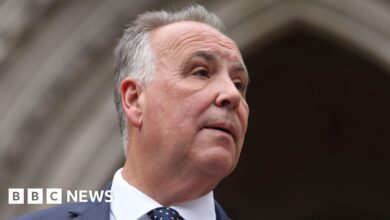Starmer considering new digital ID scheme to tackle illegal working

Paul SeddonPolitical reporter
Sir Keir Starmer has confirmed for the first time the government is looking at digital ID as a way to tackle illegal immigration.
The prime minister said a new identity programme could play an “important part” in reducing the incentive to enter the UK without permission.
He added things had “moved on” since the fraught debate over ID cards under the last Labour government in the mid-2000s.
But Conservative leader Kemi Badenoch said: “I think as a way of helping to control immigration, it is not really going to solve the problem.”
Speaking to political editor Chris Mason, Sir Keir said: “We all carry a lot more digital ID now than we did 20 years ago, and I think that psychologically, it plays a different part.”
Asked whether a new scheme could play a role in reducing the attractiveness of the UK as a destination for illegal migrants, he added: “My instinct is it can play an important part. Obviously we need to look through some of the detail.”
He added that, two decades on from the row over New Labour’s physical ID card scheme, the public was likely to “look differently” at a digital-based scheme.
He did not confirm whether any new digital ID scheme would be mandatory.
By law, employers have to check that prospective candidates have the right to work in the UK.
Since 2022, they have been able to carry out checks on passport-holding British and Irish citizens by using digital verification services that have been certified by the government.
A Home Office online scheme also exists to verify the status of some non-British or Irish citizens, whose immigration status is held electronically.
It is understood officials are looking at whether requiring a digital ID could provide a more consistent approach to verifying identity.
They are also thought to be exploring whether the scheme could reduce the use of fake documents, and make it easier to target enforcement activity.
Estonia visit
Sir Keir’s comments are the most positive remarks yet by the prime minister about the idea, which is likely to reignite a debate over civil liberties.
Cabinet Office minister Pat McFadden has visited Estonia recently to examine the Baltic state’s extensive use of digital identity to allow citizens to access government and some private services such as medical records, voting and banking.
The government has previously rejected a digital ID proposal suggested by former Labour Prime Minister Sir Tony Blair, whose government introduced plastic ID cards in the late 2000s.
Legislation to introduce the scheme was the subject of bitter clashes in the House of Lords, and plans to make them compulsory for UK citizens was later dropped.
Around 15,000 entered circulation but the scheme was scrapped, and database destroyed, by the Conservative-Liberal Democrat coalition government in 2011.
Asked for the Tory position on digital ID, leader Kemi Badenoch said it would not help the government fulfil its pledge “smash the gangs or stop the boats”.
“A lot of people who come to the country end up disappearing into the grey economy, or the black economy. and working illegally,” she added.
“Digital ID cards would not fix that.”
Checks extended
There are sanctions including fines of up to £60,000 per unauthorised worker in cases where foreign workers are found to be working illegally.
For agency workers, the responsibility lies with the agency to conduct the relevant checks.
In March, the government announced the requirement to conduct a test would be extended to self-employed contractors carrying out work on behalf of a company.
Currently, firms are responsible for conducting checks on such workers only if they have sponsored the visa allowing them to work in the UK.
Home Secretary Yvette Cooper argued the extension would help enforcement in the so-called gig economy, where many workers are employed in temporary or casual roles.
In July, French President Emmanuel Macron said the UK had agreed to address the “fight against illegal work” as part of pull factors attracting illegal migrants.
The government has also been under pressure to find alternative living arrangements for around 32,000 asylum seekers currently living in taxpayer-funded hotels whilst their claims are processed.
Ministers have promised to stop using hotels to house asylum seekers by the time of the next election, due by 2029.
Sir Keir said he had asked officials at the Home Office and Ministry of Defence to “work at pace” to identify military sites that could be used to provide alternative accommodation.





